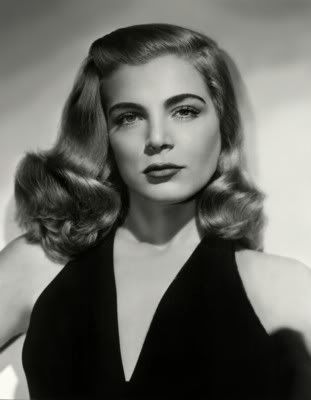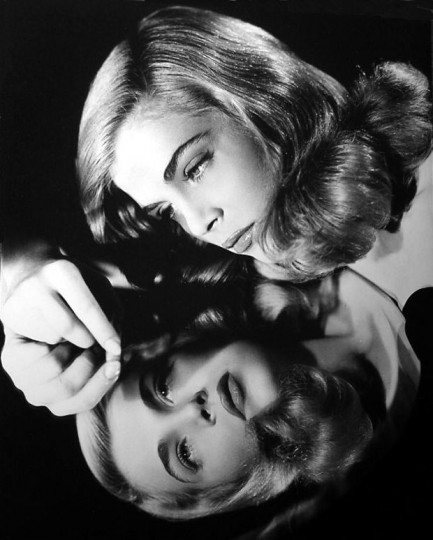Lizabeth Scott, Film Noir Siren, Dies at 92
By ROBERT D. McFADDEN
February 6th, 2015
 Ms. Scott with Van Heflin in The Strange Love of Martha Ivers (1946), one of her first films.
Ms. Scott with Van Heflin in The Strange Love of Martha Ivers (1946), one of her first films.
Lizabeth Scott, a sultry blonde with a come-hither voice cut out for the seething romantic and homicidal passions of her Hollywood Film Noir roles in the late 1940s and early '50s, died on January 31st in Los Angeles. She was ninety-two. Cedars-Sinai Medical Center confirmed the death, but did not give a cause.
Ms. Scott was billed as another Lauren Bacall or Veronica Lake, and in many of her twenty-two films she portrayed a good-bad girl with love in her head and larceny in her heart, or vice versa. Her co-stars were Humphrey Bogart, Kirk Douglas, Burt Lancaster and other tough gents, and her movies' titles were lurid stuff:
The Strange Love of Martha Ivers,
Dead Reckoning,
Pitfall,
Dark City,
I Walk Alone, and
Bad for Each Other
"When you say ambition to me, that’s when you get me started!" Ms. Scott was widely quoted as saying. "My greatest ambition is to be the whoppingest best actress in Hollywood. You can’t blame a girl for trying! I don’t want to be classed as a ‘personality,’ something to stare at. I want to have my talents respected, not only by the public but by myself."
She had the goods: the luminous eyes and moist lips that belied a heart of stone, the slinky figure, the sculptured cheekbones, the cascading hair and husky voice suitable for torch songs or seductive close-ups. She gave a riveting performance as a killer in
Too Late for Tears in 1949 and was captivating as Charlton Heston’s singer girlfriend in the revenge thriller
Dark City in 1950. By then postwar Film Noir was losing its appeal, and her last foray into the genre was in
The Racket (1951), with Robert Mitchum and Robert Ryan. Later in the '50s she drifted into mediocre melodramas and even a Western. Ms. Scott’s heyday lasted barely a decade, and film historians say it never matched the Bacall magic or the Lake sensuality. Her later performances were scorned by many critics, though some said she was thoroughly convincing in unsympathetic roles.
Her film career was further damaged, perhaps fatally, by an innuendo-laced 1954 article in
Confidential magazine suggesting that she was a lesbian. The article noted that she had never married, quoted her as saying that she “always wore male colognes, slept in men’s pajamas, and positively hated frilly feminine dresses,” and said that she had been “taking up almost exclusively with Hollywood’s weird society of baritone babes.” Ms. Scott sued for $2.5 million, contending that the magazine had portrayed her in a “vicious, slanderous and indecent” manner. The outcome was never made public, but the suit, filed in 1955, was believed to have been settled out of court for an undisclosed sum. The scandal, however, was nearly ruinous. She made two more unremarkable films in the 1950s, then turned to singing, recording for RCA Records.
 Dean Martin, Lizabeth Scott, and Hal B. Wallis on the set of Scared Stiff.
Dean Martin, Lizabeth Scott, and Hal B. Wallis on the set of Scared Stiff.
There were also television appearances, on game shows and occasionally on drama series including
"Studio 57",
"The 20th Century Fox Hour",
"Adventures in Paradise", and
"The Third Man". She performed on radio shows like "The Lux Radio Theater", and even did television voice-overs for juice and cat-food commercials. She appeared in her last film,
Pulp, with Michael Caine and Mickey Rooney, in 1972.
In her later years, Ms. Scott led a quiet, largely private life. She helped raise funds for museums, art galleries and charities, including hemophilia research and hunger, and turned down many requests for interviews and guest appearances. There were rumors in the 1960s that she might marry Hal B. Wallis, the producer who discovered her, but she remained single. The film historian Karen Burroughs Hannsberry, in
Femme Noir: Bad Girls of Film (1998), called Ms. Scott "a unique product of Hollywood’s Golden Age" and "one of Film Noir’s archetypal femmes."
She was born Emma Matzo on September 29th, 1922, in Scranton, PA, one of six children of Ukrainian immigrants. She attended Marywood College, but quit to move to New York City. She enrolled at the Alvienne School of Drama, got work in summer stock and modeling, and started calling herself Elizabeth Scott. Information on survivors was not immediately available.
In 1942, Ms. Scott was the understudy for Tallulah Bankhead in the Broadway production of Thornton Wilder’s "The Skin of Our Teeth" but had no chance to substitute. When Miriam Hopkins replaced Bankhead in 1943, Ms. Scott returned to modeling. But she was called back to the show to fill in for an ailing Gladys George, who had replaced Hopkins. She won rave reviews, and played the lead in the play's Boston run. Mr. Wallis noticed her. Screen tests and a Paramount contract followed. She had already dropped the “E” in her first name — “to be different,” she said. She made her film debut in
You Came Along (1945), then was cast in
The Strange Love of Martha Ivers (1946), with Barbara Stanwyck and Kirk Douglas. Her scenes were limited, but reviewers praised her performance.
 Lizabeth Scott and Humphrey Bogart in Dead Reckoning (1947).
Lizabeth Scott and Humphrey Bogart in Dead Reckoning (1947).
Her breakthrough was
Dead Reckoning (1947), opposite Bogart. In her ensuing mystery-thrillers —
I Walk Alone and
Pitfall in 1948,
Too Late for Tears in 1949,
Paid in Full in 1950 — she joined the classic pantheon of Film Noir: beautiful schemers caught in maelstroms of jealousy, greed, betrayal and murder, but irresistible.
Bogart, in
Dead Reckoning, put it this way: "I didn’t want any part of her, but I kept smelling that jasmine in her hair, and I wanted her in my arms. Yeah. I knew I was walking into something."
http://www.nytimes.com/2015/02/07/movies/lizabeth-scott-film-noir-siren-dies-at-92.html?_r=0


